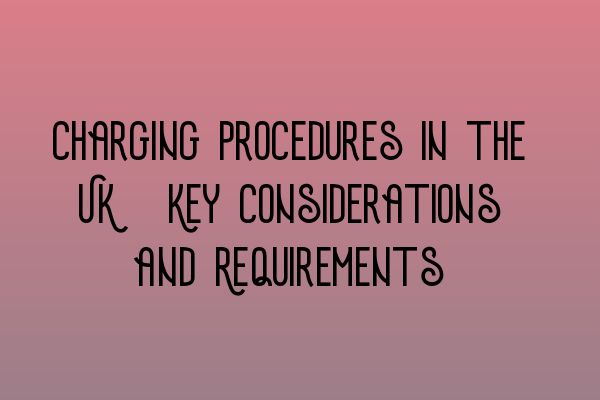Charging Procedures in the UK: Key Considerations and Requirements
When it comes to criminal law in the UK, charging procedures play a vital role in the legal process. Understanding these procedures and their requirements is crucial for both legal professionals and individuals involved in criminal cases. In this article, we will explore the key considerations and requirements of charging procedures in the UK.
1. Overview of Charging Procedures
Charging procedures involve the formal accusation of a person for committing a criminal offense. These procedures ensure that individuals are informed about the charges against them and provide them with an opportunity to defend themselves in court. The charging process follows a specific set of rules and requirements to protect the rights of the accused.
2. Who Can Initiate the Charging Process?
In the UK, charging decisions are typically made by the Crown Prosecution Service (CPS). This independent organization is responsible for prosecuting criminal cases on behalf of the state. The CPS carefully evaluates the evidence provided by the police and other investigative agencies to determine whether there is sufficient evidence to bring charges against an individual. This decision-making process must be fair, unbiased, and based on the available evidence.
3. Key Considerations in Charging Decisions
Charging decisions in the UK are made following a two-stage test, known as the Full Code Test. The Full Code Test requires the CPS to carefully consider two key factors:
i. Sufficient Evidence
The CPS must be satisfied that there is sufficient evidence to provide a realistic prospect of conviction. This means that the evidence must be strong enough to convince a jury of the defendant’s guilt beyond a reasonable doubt. If the evidence is weak or unreliable, the CPS may decide not to proceed with the charges.
ii. Public Interest
Even if there is sufficient evidence, the CPS must also consider whether it is in the public interest to prosecute the case. The public interest factor takes into account various considerations, such as the seriousness of the offense, the harm caused to the victim, and the impact on the community. The CPS aims to ensure that resources are allocated effectively and that only cases with a realistic prospect of conviction proceed to court.
It is important to note that the CPS operates independently and is committed to making fair and impartial charging decisions.
4. Charging Procedure Requirements
Once the CPS has decided to proceed with charges, certain procedural requirements must be met. These requirements include:
i. Charge Sheet
A charge sheet is a formal document that sets out the criminal charges against an individual. It contains information such as the date of the offense, details of the alleged offense, and the relevant laws that have been violated. The charge sheet is served to the accused person, allowing them to understand the specific allegations brought against them.
ii. Initial Court Appearance
After the charges have been filed, the accused person will be required to make an initial court appearance. During this appearance, the accused person will be formally informed of the charges and asked to enter a plea (guilty or not guilty). The court will also consider bail conditions and any further steps in the legal process.
iii. Disclosure of Evidence
Both the prosecution and the defense have a duty to disclose all relevant evidence to each other. This ensures that both parties are aware of the evidence that will be relied upon during the trial. Full disclosure promotes fairness and allows the defense to prepare an effective case.
iv. Pre-trial Preparations
Prior to the trial, both the prosecution and the defense will engage in pre-trial preparations. This includes gathering evidence, interviewing witnesses, conducting legal research, and making necessary applications to the court. Adequate preparation is essential to ensure a fair trial.
v. Trial and Verdict
The trial is where the evidence is presented, and the guilt or innocence of the accused is determined. The court will carefully weigh the evidence and arguments presented by both sides before reaching a verdict. If the accused is found guilty, the court will impose an appropriate sentence.
5. Conclusion
Charging procedures in the UK are intricate and require a comprehensive understanding of the legal framework. The CPS plays a crucial role in making charging decisions based on sufficient evidence and public interest. Meeting the procedural requirements ensures a fair and transparent legal process. If you require further assistance with criminal charges or legal representation, contact SQE Criminal Law & Practice Law UK for expert advice.
Related Articles:
- Legal Representation for Delaware LLCs in the UK: Expert Advice
- Ensuring Ethical Business Practices: Delaware’s Code of Conduct
- Legal Challenges for UK Businesses in the U.S.: Strategies for Overcoming Hurdles
- UK Criminal Law: An In-Depth Analysis of the British Legal System
- Legal Challenges for UK Businesses in the U.S.: Strategies for Overcoming Hurdles
